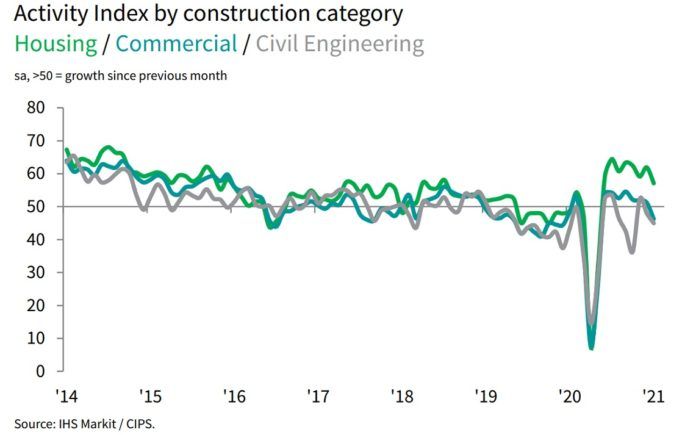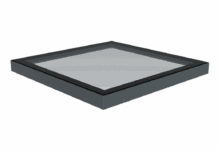IHS Markit’s recent January PMI data has illustrated a marginal decline in UK construction output, ending a seven-month period of expansion.
The latest survey also signalled a slowdown in new order growth to its weakest since June 2020. Construction companies often noted that the third national lockdown and concerns about the near-term economic outlook had led to greater hesitancy among clients, especially for new commercial projects.
Meanwhile, transport shortages and delays at UK ports resulted in another severe downturn in supplier performance during the month, with around 45% reporting longer lead times for the delivery of construction inputs, while only 1% noted an improvement.
At 49.2 in January, down from 54.6 in December, the headline seasonally adjusted IHS Markit/CIPS UK Construction Total Activity Index signalled a decline in overall construction output for the first time since May 2020. However, the rate of contraction was only marginal.
A renewed fall in commercial activity (index at 46.2) and another drop in work on civil engineering projects (45.0) stood in contrast with strong growth in the residential category (57.1). Nonetheless, the latest increase in housebuilding was the slowest since the rebound began in June 2020.
Lost momentum
New business volumes rose slightly in January, but the rate of expansion lost considerable momentum since the end of 2020. Survey respondents mostly commented on delayed projects in the commercial segment due to the pandemic, while some also cited less favourable demand conditions for residential work.
Employment numbers also dropped in January, reversing the marginal expansion seen during December. Job cuts were primarily linked to the non-replacement of leavers following project completions.
Purchasing activity increased for the eighth consecutive month in January, although the rate of growth eased further from November’s recent peak. Strong demand for construction inputs and ongoing transportation issues resulted in the steepest downturn in supplier performance since May 2020.
Furthermore, construction companies continued to experience intense cost pressures, driven by rising prices for plaster, steel and timber. The overall rate of input price inflation accelerated to its highest for just over two and-a-half years.
Finally, despite the latest data indicating that business expectations for the year ahead remained positive in January, the degree of confidence eased to a three-month low.
Commenting on the findings, chief executive of the Federation of Master Builders (FMB), Brian Berry, said: “These are difficult times for builders who are weathering a storm of product delays, material prices rising and a dropping in consumer confidence. The government has been clear that construction should stay open, and local builders stand ready to support our economic recovery. But they need greater support to build back better and greener across the country, as shown by today’s [4 February] figures and echoed in the FMB’s State of Trade research.
“The Chancellor must scrap reverse charge VAT immediately, a damaging new tax policy that will cut cashflow by around 20% for my members. A three-month extension to the Stamp Duty holiday would help address the slowdown in housebuilding, avoiding sales falling through and consumers being priced out of their dream homes.”
Brian concluded: “Finally, the Chancellor should cut VAT on home improvement works. We have never demanded more from our homes, and they must be adapted to the ‘new normal’. They must also be upgraded with green measures, delivered according to a National Retrofit Strategy for all our homes. This will set us on the road to net zero carbon emissions by 2050. Cutting VAT will unlock additional capital to invest back into our greatest assets.”




